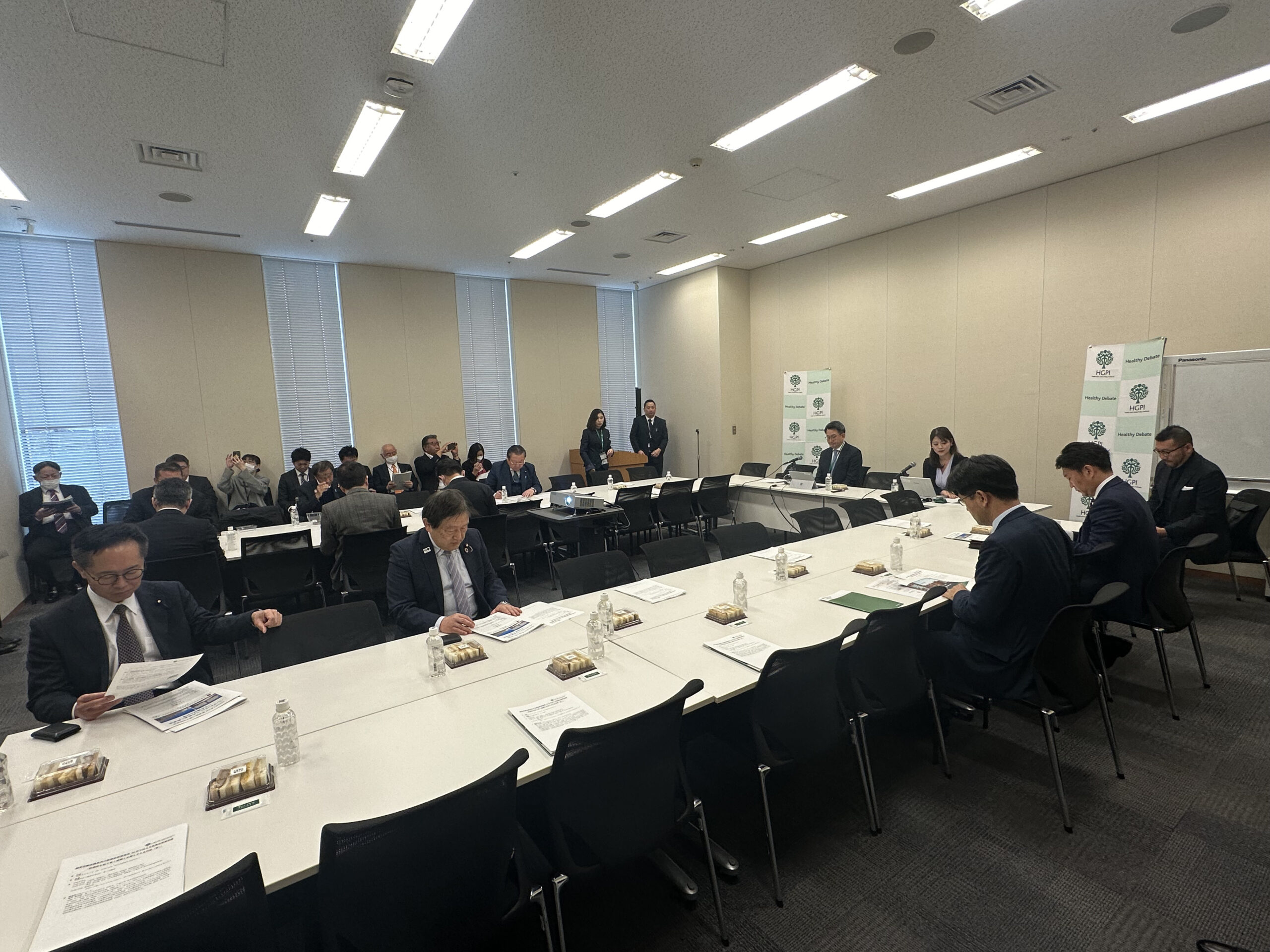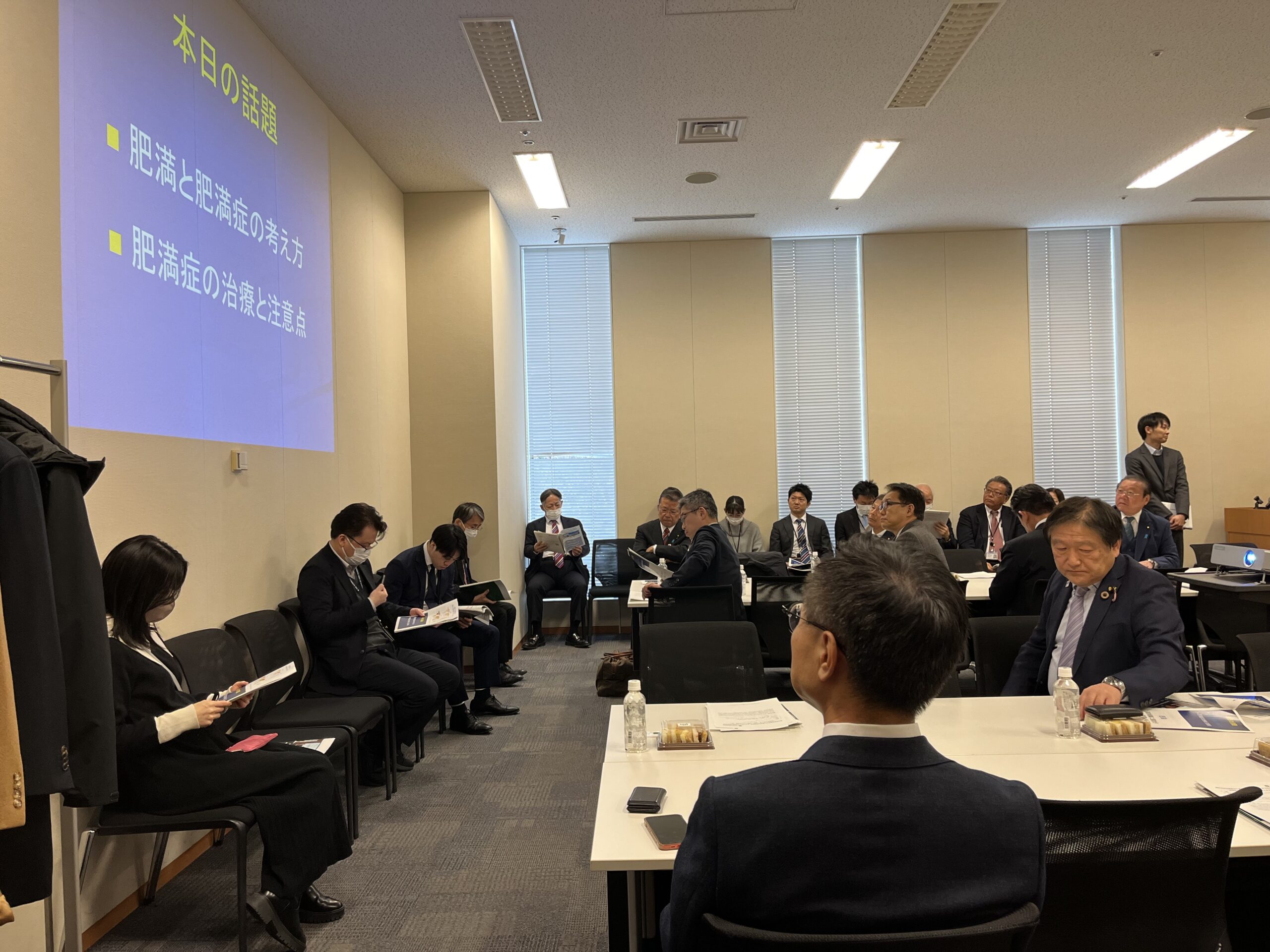[Event Report] Non-partisan Diet Member Briefing – 30-minute Health Policy Update: “Issues Surrounding and Necessary Measures Against Obesity Disease” (February 2, 2024)
date : 3/4/2024
Tags: Diet Member Briefing, NCDs, Obesity
![[Event Report] Non-partisan Diet Member Briefing – 30-minute Health Policy Update: “Issues Surrounding and Necessary Measures Against Obesity Disease” (February 2, 2024)](https://hgpi.org/en/wp-content/uploads/sites/2/dmb-ob-20240202-top-IMG_8089-scaled-1.jpg)
Health and Global Policy Institute (HGPI) launched the “Obesity Control Promotion Project” in 2022 and hosted an installment of the 30-minute Health Policy Update series, “Issues Surrounding and Necessary Measures Against Obesity Disease”.
Dr. Koutaro Yokote (President, Japan Society for the Study of Obesity; Director General, Chiba University Hospital) gave a lecture on general obesity and obesity requiring medical intervention during a pandemic, explaining current initiatives and future steps.
■Points
Concepts of general obesity and obesity requiring medical intervention
- Comparing Body Mass Index (BMI)[1] values by country for those aged 18 and older in 1985 and 2017, obesity is increasing worldwide, though less significantly in Japan. BMI is a body mass index that provides a simple measure of fat storage. There is a relationship between BMI and the development of diseases where neither a low BMI (underweight) nor a high BMI (overweight) is good. A BMI of 22 is considered the healthiest physique with the lowest chance of disease.
- Obesity is defined in ‘Guidelines for the Management of Obesity Disease 2022’ as a state of excessive storage of fat in adipose tissue with a BMI of 25 or higher. According to the Japan Society for the Study of Obesity, a BMI of 25 or higher with health problems such as diabetes and hypertension is called “obesity disease,”, and a BMI of 35 or higher is called high-degree obesity. Medical treatment is necessary for obesity disease.
- Visceral fat obesity is more common in men, while visceral fat obesity increases after menopause in women, and subcutaneous fat obesity is more common in younger women. The concern with visceral fat storage is that as visceral fat accumulates, fat cells secrete more harmful hormones that promote diabetes and arteriosclerosis, and fewer positive hormones that prevent them.
Treatment and Precautions for Obesity Disease
- The concept of obesity disease treatment involves reducing calorie intake through diet therapy, increase calorie consumption through exercise therapy, and behavioral therapy, as well as surgical and drug intervention as needed, in a multidisciplinary team approach.
- For severe cases of high-degree obesity that cannot be reduced by diet therapy and exercise therapy alone, surgical procedures such as a laparoscopic sleeve gastrectomy are effective for weight loss. In Japan, this has been covered by medical insurance since 2015.
- New drugs have been approved for obesity disease and obesity. In 2024, prophylaxis for obesity disease will also be available as an over-the-counter drug for individuals who meet the requirements. On the other hand, the recent off-label use of drugs for type 2 diabetes and obesity disease with weight loss effects for aesthetic purposes has become problematic.
- Gender and age may be a consideration in obesity control. The increase in underweight individuals below a BMI of 18.5, especially among young women, is problematic. Elderly people who are trying to maintain or increase muscle mass rather than forcing themselves to lose weight also need to be careful.
- In the treatment of obesity, it is important to screen individuals who need to lose weight medically and to treat and prevent obesity appropriately. The goal of obesity treatment is to improve the quality of life (QOL) of individuals with obesity and obesity disease. Weight loss and the improvement of health problems and health risks through diet therapy, exercise therapy, and other treatments contribute to an improvement in QOL. In addition, society needs to comprehensively address the elimination of stigma and the dissemination of correct knowledge regarding this disease.
[Program] (titles omitted)
Explanatory Introduction/Introduction of Obesity Disease Policy Recommendations
Eri Yoshimura (Senior Manager, HGPI)
Lecture: “Issues Surrounding and Necessary Measures Against Obesity Disease.”
Koutaro Yokote (President, Japan Society for the Study of Obesity; Director General, Chiba University Hospital)
Q&A session


[1] BMI = weight (kg)/height (m) 2
Top Research & Recommendations Posts
- [Policy Recommendations] The Path to a Sustainable Healthcare System: Three Key Objectives for Public Deliberation (January 22, 2026)
- [Research Report] The 2025 Public Opinion Survey on Healthcare in Japan (March 17, 2025)
- [Research Report] Perceptions, Knowledge, Actions and Perspectives of Healthcare Organizations in Japan in Relation to Climate Change and Health: A Cross-Sectional Study (November 13, 2025)
- [Policy Recommendations] Reshaping Japan’s Immunization Policy for Life Course Coverage and Vaccine Equity: Challenges and Prospects for an Era of Prevention and Health Promotion (April 25, 2025)
- [Research Report] The 2023 Public Opinion Survey on Satisfaction in Healthcare in Japan and Healthcare Applications of Generative AI (January 11, 2024)
- [Research Report] AMR Policy Update #4: Cancer Care and AMR (Part 1)
- [Public Comment Submission] “Assessment Report on Climate Change Impacts in Japan (Draft Overview)” (December 24, 2025)
- [Policy Recommendations] Developing a National Health and Climate Strategy for Japan (June 26, 2024)
- [Research Report] The Public Opinion Survey on Child-Rearing in Modern Japan (Final Report) (March 4, 2022)
- [Research Report] Survey of Japanese Physicians Regarding Climate Change and Health (December 3, 2023)
Featured Posts
-
2026-01-09
[Registration Open] (Hybrid Format) Dementia Project FY2025 Initiative Concluding Symposium “The Future of Dementia Policy Surrounding Families and Others Who Care for People with Dementia” (March 9, 2026)
![[Registration Open] (Hybrid Format) Dementia Project FY2025 Initiative Concluding Symposium “The Future of Dementia Policy Surrounding Families and Others Who Care for People with Dementia” (March 9, 2026)](https://hgpi.org/en/wp-content/uploads/sites/2/dementia-20260309-top.png)
-
2026-02-05
[Registration Open] (Webinar) The 141st HGPI Seminar “Current Status and Future Prospects of Korea’s Obesity Policy: Voices of People with Lived Experience in Policy Promotion” (March 3, 2026)
![[Registration Open] (Webinar) The 141st HGPI Seminar “Current Status and Future Prospects of Korea’s Obesity Policy: Voices of People with Lived Experience in Policy Promotion” (March 3, 2026)](https://hgpi.org/en/wp-content/uploads/sites/2/hs141-top-1.png)
-
2026-02-06
[Research Report] AMR Policy Update #5: Cancer Care and AMR (Part 2)
![[Research Report] AMR Policy Update #5: Cancer Care and AMR (Part 2)](https://hgpi.org/en/wp-content/uploads/sites/2/HGPI_20260204_AMR-Policy-Update-5.png)




